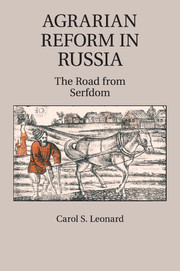
- Cited by 7
-
Cited byCrossref Citations
This Book has been cited by the following publications. This list is generated based on data provided by Crossref.
Lankina, Tomila 2012. Unbroken Links? From Imperial Human Capital to Post-Communist Modernisation. Europe-Asia Studies, Vol. 64, Issue. 4, p. 623.
Kopsidis, Michael Bruisch, Katja and Bromley, Daniel W. 2015. Where is the backward Russian peasant? Evidence against the superiority of private farming, 1883–1913. The Journal of Peasant Studies, Vol. 42, Issue. 2, p. 425.
Leonard, Carol Scott 2021. Global Encyclopedia of Public Administration, Public Policy, and Governance. p. 1.
Leonard, Carol Scott 2022. Global Encyclopedia of Public Administration, Public Policy, and Governance. p. 479.
Leonard, Carol Scott 2022. Russian and Western Economic Thought. p. 249.
Pasternak, Katarzyna 2023. Prace Bałtystyczne. Język – Literatura – Kultura, t. 8.
Zhuravskaya, Ekaterina Guriev, Sergei and Markevich, Andrei 2024. New Russian Economic History. Journal of Economic Literature, Vol. 62, Issue. 1, p. 47.
- Publisher:
- Cambridge University Press
- Online publication date:
- June 2011
- Print publication year:
- 2010
- Online ISBN:
- 9780511780639




